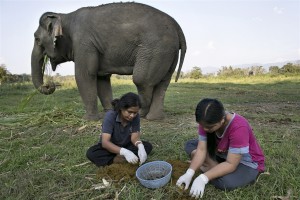This is happening.
 Maybe I just don’t understand enough about different cultures, maybe it’s just coffee, but in a remote corner of Thailand bordering Myanmar and Laos, Blake Dinkin – a Canadian (where elephants are rampant) — decided it was perfect for a legitimate enterprise that blends conservation with business.
Maybe I just don’t understand enough about different cultures, maybe it’s just coffee, but in a remote corner of Thailand bordering Myanmar and Laos, Blake Dinkin – a Canadian (where elephants are rampant) — decided it was perfect for a legitimate enterprise that blends conservation with business.
“When I explained my project to the mahouts (elephant riders), I know that they thought I was crazy,” the 44-year-old Canadian founder of Black Ivory Coffee, which uses the digestive tract of elephants to create a high-end brew for coffee connoisseurs.
Initially, he considered using civet cats to make “kopi luwak” coffee, which uses beans collected from the droppings of the Asian cats. But the quality of the end product has weakened as demand has grown in Southeast Asia — including in Thailand, Indonesia and Vietnam.
Lions and giraffes also made the shortlist of prospective coffee filters, but eventually Dinkin settled on elephants after discovering that the creatures sometimes eat coffee during periods of drought in Southeast Asia.
He also teamed up with an elephant rescue charity which saves the creatures from the tourist trade.
The enzymes in the elephant’s stomach function as a kind of slow cooker, he said, where the coffee beans marinate alongside the herbs and fruits the animal also eats.
As the beans work their way through the elephant’s digestive tract — a 17-hour process — the digestive acid takes the bitterness out of the bean.
“I lose a lot of beans in the bath in the morning,” he said, explaining that the elephants sometimes defecate in the river while bathing.
Who doesn’t?
The coffee retails for $1,880 per kilogram — or $13 for an espresso-sized cup.
